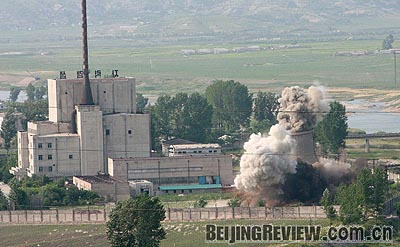|

North Korea has finally begun to denuclearize. On June 26, North Korean Ambassador to China Choe Jin Su submitted his country's nuclear declaration to Wu Dawei, China's Vice Foreign Minister and top negotiator on the North Korean nuclear issue. The next day, it demolished the cooling tower at the Yongbyon nuclear complex presumably to draw the world's attention to its progress and demonstrate its determination for denuclearization.
In response, the United States announced that it would remove North Korea from its list of "state sponsors of terrorism" and terminate the application of the Trading With the Enemy Act as of June 27.
Wu released the Statement by the Chair of the Six-Party Talks, saying that the talks have "made positive progress in the second-phase actions for the implementation of the Joint Statement."
The six parties-China, the United States, North Korea, South Korea, Japan and Russia-issued the Joint Statement on September 19, 2005, setting the goal of realizing verifiable denuclearization of the Korean Peninsula.
Under their Second Phase Actions for the Implementation of the Joint Statement released on October 3, 2007, North Korea agreed to abandon all nuclear weapons and programs and declare all its nuclear programs and facilities by the end of 2007.
The international community generally welcomes the progress in the North Korean nuclear issue. But there are still voices questioning North Korea's sincerity because the country did not fulfill its obligations as scheduled. In fact, North Korea had reason for the delay. As a principled agreement, the Joint Statement was not expected to address problems emerging during its implementation. North Korea and the United States ran into conflicts over the amount of weapons-grade plutonium extracted by North Korea and its uranium enrichment plan and nuclear cooperation with Syria. North Korea told the United States that it had produced 30 kg of plutonium, but U.S. estimates put the amount at 50 kg. Also, North Korea denied U.S. charges that it had a uranium enrichment plan and was engaged in nuclear proliferation.
| 